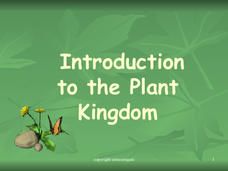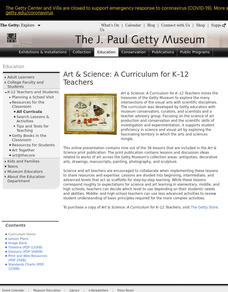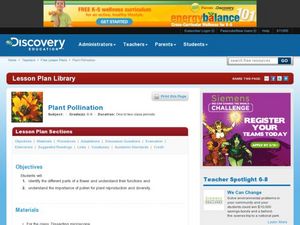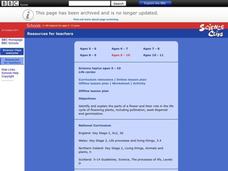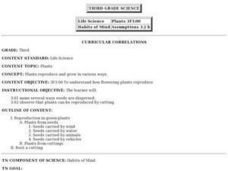Curated OER
PLANT PARTS WE EAT
Young scholars identify an assortment of vegetables and learn how to locate the parts humans use for food. Students identify the plant parts we eat. Young scholars color the pictures on their worksheets as provided. Students match the...
Curated OER
Plants 1: Plant Parents
Students review their prior knowledge on plants. In groups, they compare and contrast the difference between reproducing asexually and sexually. Using the internet, they research how some plants can be forced to produce asexually.
Curated OER
Investigation of Meiosis in Common Plants and Animals
Students witness various stages of mitosis through preparing onion root tip slides. With teacher guidance, they learn a great deal through the hands-on process of preparing the slides themselves.
Curated OER
Sunflowers a la VanGogh
Second graders view two VanGogh Sunflower reproductions, analyze differences in color and background between two, identify parts of sunflower, including stem and petals, and paint their own sunflowers using tempera paint.
Biology Junction
Plant Diversity
Ginkgo trees existed for more than 350 million years, and, at this time, only one species still remains. While plant diversity generally increases over geologic time, some interesting exceptions occur. Young scientists learn about plant...
Curated OER
Yellow Days: Studying Vincent van Gogh's Painting
Students examine the painting, "Sunflowers," by Vincent van Gogh noting the use of the yellow color, the wiggly lines, and the "globs" of paint used to create the picture. Pictures are painted using van Gogh's image as a model.
Biology Junction
Introduction to the Plant Kingdom
Plants provide humans with food, shelter, and medications. Scholars gain a better appreciation for plants after learning their functions, divisions, and early ancestors. Each sub-topic includes slides highlighting vocabulary and...
Curated OER
Plants And Pollination
Students describe sexual reproduction in plants, including the process of pollination, how insects assist in pollination, and how pollination differs from fertilization. They also explore the importance of honey bees to Arizona agriculture.
Curated OER
Germination: Name that Seed
High schoolers investigate seeds, flowers and germinating seeds. In this germination lesson plan, students observe a stalk of corn, a corn seed, Gladiolas and glass jars containing germinating sees and plants. High schoolers answer 8...
Curated OER
Clearly Classified
Young scholars review the classification system for living organisms and apply it the classification of insects and flowers in the still life by Ambrosius Bosschaert. They create a chart classifying the animals and plants in the painting...
Curated OER
Classifying Plants and Insects
Art and science come together in a lesson based on Flower Still Life by Ambrosius Bosschaert the Elder. Learners classify plants and insects in the painting by color, leaf shape, size, reproduction, and season of bloom.
Curated OER
Plant Pollution
Students study the different parts of a flower and their functions. In this pollination activity students study a flower under a microscope.
Curated OER
Plant Life Cycle
In this exploring the processes from seed to reproduction of a plant online interactive worksheet, students read a passage explaining the plant life cycle and answer multiple choice questions about what they read. Students choose 8 answers.
Curated OER
Plants 'n' Bugs
Second graders experiment to find if pollinators have color preferences. In this plant and bug lesson, 2nd graders gather information about how flowers pollinate. Students participate in a pollination experiment using the...
Nemours KidsHealth
Self-Esteem: Grades K-2
Second graders create a flower where each petal has their talents and unique qualities on the flower. For this self esteem lesson plan, 2nd graders understand that they are all special in their own way.
Curated OER
Too Bee Or Not To Bee
Students recognize that bees are important in the reproduction of plants and to the survival of animals. In this bee lesson, students become familiar with the parts of bees and how those adaptations help them pollinate plants....
Curated OER
Living Water
Students read an ancient Asian fairy tale. While visiting a local park, they collect both male and female seeds found in cones. They identify the type of trees they found the cones by and discuss what they are used for. In groups, they...
Curated OER
Plants and Animals, Partners in Pollination
Students participate in multiple hands-on activities to explore reproduction and pollination. In groups, using a cotton swab and powder, students simulate being pollinators and plants. They name the parts of the flowers and the function...
Curated OER
Life cycles
Students identify and explain the parts of a flower and their role in the life cycle of flowering plants, including pollination, seed dispersal, and germination. Students recap the following information: that plants need light, warmth,...
Curated OER
Plants Reproduce and Grow in Various Ways
Third graders take a walk around the outside of the school and examine their clothing to see if they picked up any seeds while on their walk. They discuss how seeds travel and how a new plant thus can form. They then observe root...
Curated OER
Botany: Rice Plant - Second Phase
Third graders make drawings that show the growth of the rice plant in the reproductive phase. In this rice plant lesson plan, 3rd graders read about the second phase of the rice plant, and then draw pictures and label them.
Curated OER
Pollen & Pollination
Students identify the different ways things are pollinated and how to manage pollen. In this pollination lesson students complete an experiment on how moths pollinate flowers.
Curated OER
What Bees Eat
Young scholars study plant and animal interdependence by studying bees and pollination. In this interdependence lesson plan, students discuss flower parts and dissect it to show its reproductive parts. Young scholars then use tissue and...
Curated OER
Pollination
Fourth graders explore the pollination process. In this plant biology lesson, 4th graders dissect a flower to identify the parts of a flower and watch a video to see seed dispersal. Students write about the pollination process.
Other popular searches
- Flower Reproduction Diagram
- Labs for Flower Reproduction
- Label Flower Reproduction
- Flower Reproduction Video
- Star Flower Reproduction
- Plants, Flower Reproduction
- Plants Flower Reproduction








